Conference on Developing National Clinical Research Center for Cancer Held in Tianjin

The conference on developing the National Clinical Research Center for Cancer (NCRCC) was held in Tianjin on July 10, 2021 to improve the national capability of cancer prevention and treatment and play a leading role as the National Clinical Research Center. The conference also aims to promote the building of the scientific and technological innovation system for cancer prevention and treatment, gather innovative resources for it, and complete its cooperative research network. The agreement on the cooperative research network was signed by the heads of NCRCC, Renji Hospital Affiliated to Shanghai Jiaotong University School of Medicine, Zhejiang Provincial People’s Hospital, The Fourth Hospital of Hebei Medical University, Shaanxi Provincial Cancer Hospital, and Qinghai University’s Affiliated Hospital. The agreement will facilitate data sharing of clinical cases through enhanced resource integration which will lay an important foundation for clinical research and translational medicine research such as etiology analysis, pathogenesis analysis, and precision medicine research.
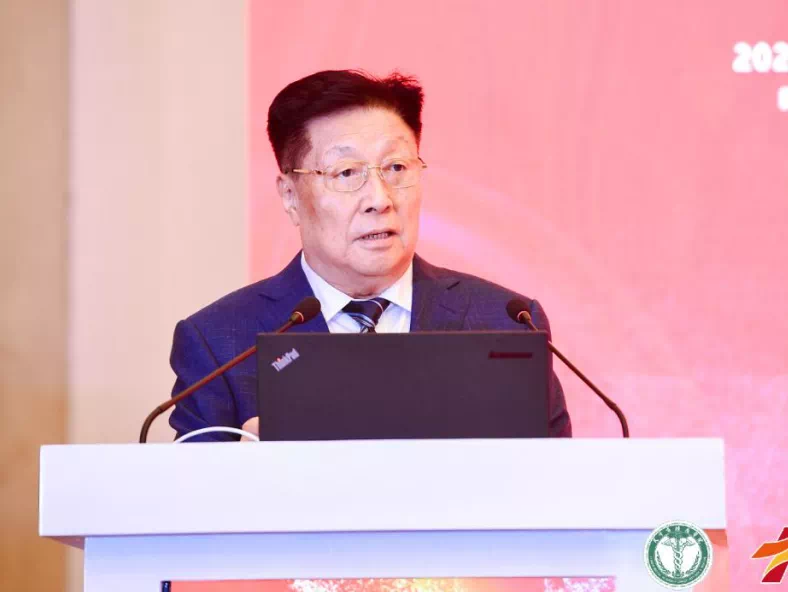
Xishan Hao, Academician of the Chinese Academy of Engineering and director of NCRCC, delivered a speech
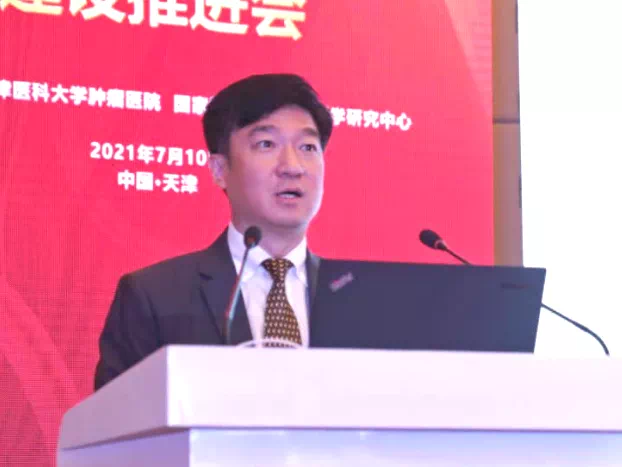
Jihui Hao, Deputy Executive Director of NCRCC and President of Tianjin Medical University Cancer Institute & Hospital (TMUCIH), briefed attendees on the building of the center’s cooperative research network
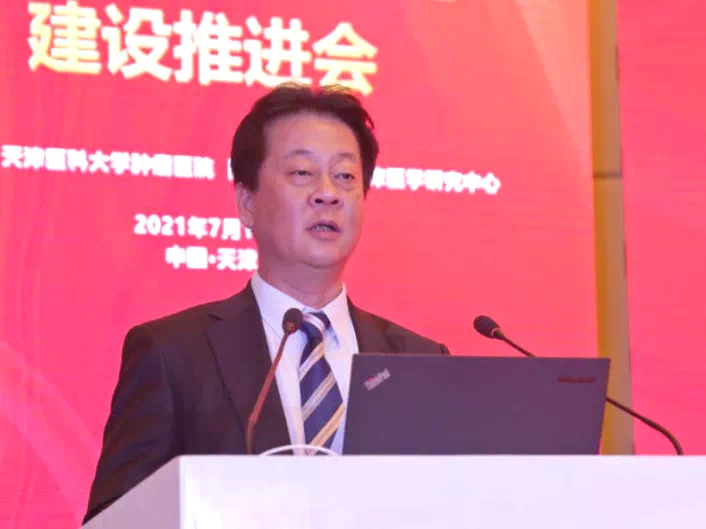
Wei Lu, Co-director of NCRCC and Party secretary of TMUCIH, announced the decision on co-building the center’s cooperative research network

The award ceremony of co-building NCRCC’s cooperative research network
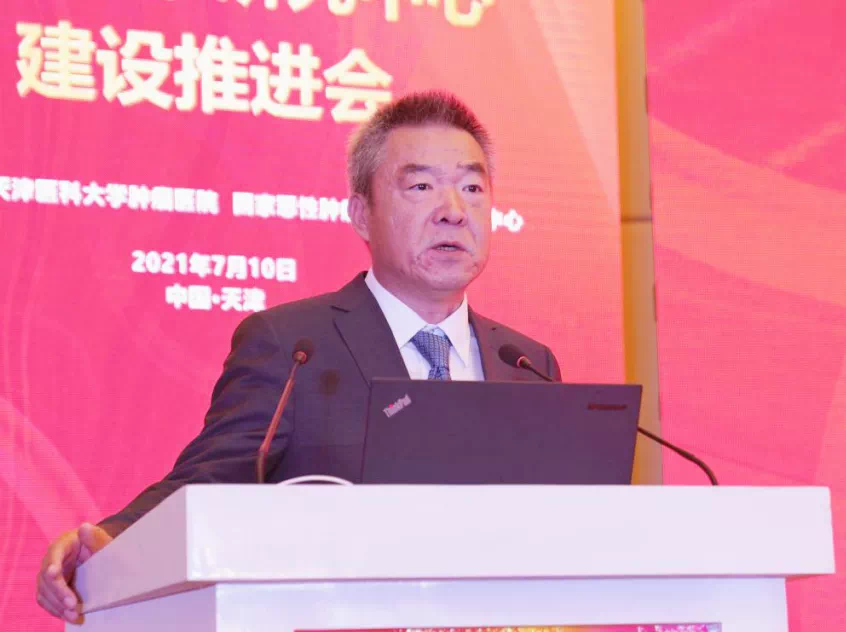
Speech by Zhi Yao, Party Secretary of Tianjin Medical University

Speech by Hao Wang, Deputy President of Tianjin Health Commission
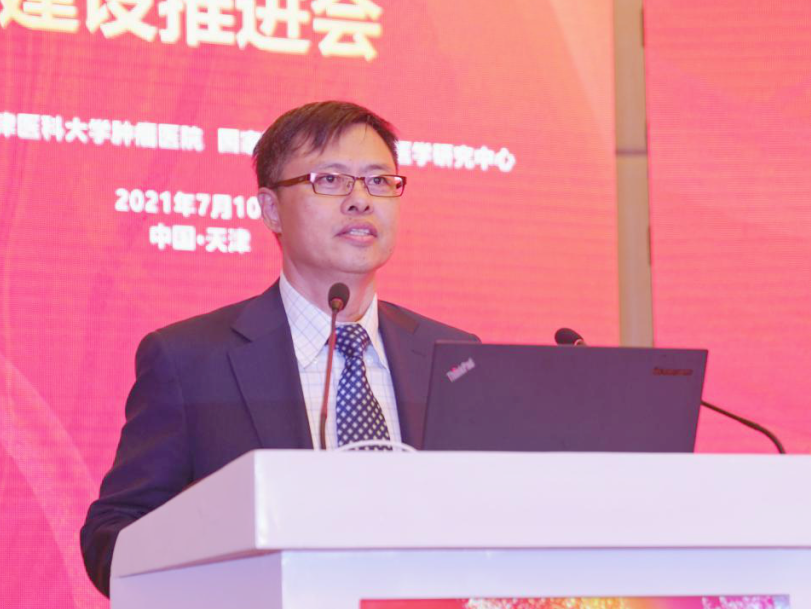
Speech by Ying Yuan, Deputy Director General of Tianjin Municipal Science and Technology Bureau

Qiang Zhao, Deputy Party Secretary and Vice President of TMUCIH presided over the opening ceremony
Approved in 2013, TMUCIH is one of the two national clinical research centers for cancer. Its director is Hao Xishan, an academician of the Chinese Academy of Engineering and director of Tianjin Cancer Institute. The key task of NCRCC is to cultivate talent, accelerate the promotion and application of scientific and technological achievements, and carry out large-scale, multi-center, high-quality clinical research by building a well-developed, efficient nationwide network as soon as possible as well as integrating and utilizing clinical data and samples in all regions.
NCRCC is the national scientific and technological innovation base for clinical research and application of research findings. Since its establishment, driven by the requirement for disease control, it has been working on clinical research, collaborative innovation, academic exchange and talent training, together with the promotion and application of technological innovation based in medical institutions with clinical application as the orientation and the support of the cooperation network. In recent years, the center has built and completed an international standard biological sample bank of tumors, molecular diagnosis and a biological information platform, and a clinical research evaluation platform, and conducted over 100 high- and new-tech studies on cell biology, molecular biology, genetics, genomics, and proteomics. All of the work provides an information platform for discussing new standards of cancer classification, diagnosis, and prognosis, developing laboratory techniques for the early detection of cancer, as well as developing translational medicine and individualized medicine. It has boosted the innovation, breakthrough, and popularization of research on cancer treatment. Its sub-centers have been built in Peking University Shenzhen Hospital, the First Hospital of China Medical University, and Jiangxi Cancer Hospital to carry out clinical research and translational medicine research and explore new models, techniques, and methods for cancer prevention and treatment. The NCRCC has received 40 science and technology awards at above ministerial and provincial level with over one thousand scientific research projects being approved and 1,600 papers included in the Scientific Citation Index. It has cultivated and brought in talent to build interdisciplinary innovative research teams. Taking the lead in formulating 320 guidelines related to cancer treatment, such as China Guideline for the Screening of Female Breast Cancer, NCRCC has promoted cancer diagnosis and treatment standards and enhanced China’s overall capability of cancer prevention and treatment.
At present, 3 sub-centers, 30 regional centers, and over one hundred members constituent NCRCC’s cooperative research network. This offers public service platforms for clinical research such as big data on cancer treatment, cancer sample resource pool, and cancer molecular diagnosis to achieve resource sharing, conduct large-scale and multicentric evidence-based evaluation research based on improved clinical diagnosis and treatment standards together with periodic training and academic exchange. NCRCC has thus promoted the application of new techniques and methods of cancer prevention and treatment, improved clinical diagnosis and treatment standards, and contributed to achieving the strategic goal of Healthy China 2030.
Adhering to the principle of overall planning, complementary advantages, two-way selection, and sustainable development, heads of NCRCC, Renji Hospital Affiliated to Shanghai Jiaotong University School of Medicine, Zhejiang Provincial People’s Hospital, The Fourth Hospital of Hebei Medical University, Shaanxi Provincial Cancer Hospital, and Qinghai University’s Affiliated Hospital signed the cooperation agreement based on the hospitals’ professional skill, research ability, and comprehensive strength. The agreement aims to perfect the innovative network of cancer prevention and treatment research, meet the regional demand for scientific and technological innovation of clinical medicine, optimize resource allocation, drive coordinated development, and accelerate the innovation, breakthrough, and popularization of cancer prevention and control. All parties have made further plans for project cooperation and research after discussing the mechanisms for discipline construction, scientific research cooperation, and application of research achievements, building and sharing clinical resource platforms including clinical sample platforms and the medical treatment research database, cooperative multicenter-clinical trial study, cooperation in academic exchange and talent training, technique training and proper technology promotion, as well as telemedicine cooperation.
Next, NCRCC will enhance overall planning and sound design, and form a national network of research on cancer prevention and control to play the leading role in this area. Focusing on the national strategic goals and targeting key issues in cancer prevention and control, it will cooperatively advance the integration of clinical application and scientific research; accelerate academic exchanges and talent training, as well as the promotion and application of research achievements which will continuously improve China's cancer prevention and treatment research.